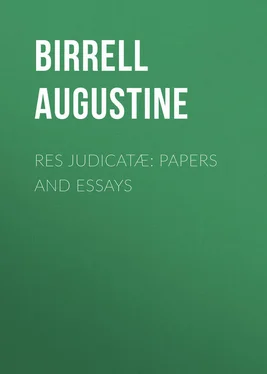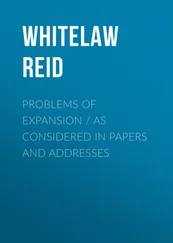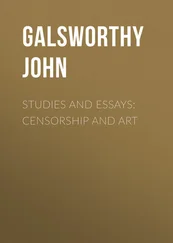Augustine Birrell - Res Judicatæ - Papers and Essays
Здесь есть возможность читать онлайн «Augustine Birrell - Res Judicatæ - Papers and Essays» — ознакомительный отрывок электронной книги совершенно бесплатно, а после прочтения отрывка купить полную версию. В некоторых случаях можно слушать аудио, скачать через торрент в формате fb2 и присутствует краткое содержание. Жанр: foreign_antique, foreign_prose, Историческая проза, на английском языке. Описание произведения, (предисловие) а так же отзывы посетителей доступны на портале библиотеки ЛибКат.
- Название:Res Judicatæ: Papers and Essays
- Автор:
- Жанр:
- Год:неизвестен
- ISBN:нет данных
- Рейтинг книги:3 / 5. Голосов: 1
-
Избранное:Добавить в избранное
- Отзывы:
-
Ваша оценка:
- 60
- 1
- 2
- 3
- 4
- 5
Res Judicatæ: Papers and Essays: краткое содержание, описание и аннотация
Предлагаем к чтению аннотацию, описание, краткое содержание или предисловие (зависит от того, что написал сам автор книги «Res Judicatæ: Papers and Essays»). Если вы не нашли необходимую информацию о книге — напишите в комментариях, мы постараемся отыскать её.
Res Judicatæ: Papers and Essays — читать онлайн ознакомительный отрывок
Ниже представлен текст книги, разбитый по страницам. Система сохранения места последней прочитанной страницы, позволяет с удобством читать онлайн бесплатно книгу «Res Judicatæ: Papers and Essays», без необходимости каждый раз заново искать на чём Вы остановились. Поставьте закладку, и сможете в любой момент перейти на страницу, на которой закончили чтение.
Интервал:
Закладка:
Nor did the men escape; a most grave and learned man writes:
'That Pamela and Clarissa have again "obtained the honour of my perusal," do you say, my dear Mr. Richardson. I assure you I think it an honour to be able to say I have read, and as long as I have eyes will read, all your three most excellent pieces at least once a year, that I am capable of doing it with increasing pleasure which is perpetually doubled by the reflection, that this good man, this charming author, is my friend . I have been this day weeping over the seventh volume of Clarissa as if I had attended her dying bed and assisted at her funeral procession. Oh may my latter end be like hers!'
It is no wonder the author of Clarissa had soon a great correspondence with ladies, married and single, young and old, virtuous and the reverse. Had he not written seven volumes, all about a girl? had he not made her beautiful, wise and witty and learned withal? had he not depicted with extraordinary skill the character of the fascinating – the hitherto resistless Lovelace, who, though accomplishing Clarissa's ruin does thereby but establish her triumph and confound himself? It is no doubt unhappily the case that far too many of Richardson's fair correspondents lacked the splendid courage of their master, and to his infinite annoyance fell in love with his arch-scamp, and prayed his creator that Lovelace might first be led to see the error of his ways, and then to the altar with the divine Clarissa. But the heroic printer was adamant to their cries, and he was right if ever man was. As well might King Lear end happily as Clarissa Harlowe .
The seven volumes caused immense talk and discussion, and it was all Clarissa, Clarissa, Clarissa. Sophia Western was, as we have seen, a comely girl enough, but she was as much like Clarissa as a ship in dock is like a ship at sea and on fire. What can you find to say of her or to her? 3 3 Richardson in a letter says this of her, 'the weak, the insipid, the runaway, the inn-frequenting Sophia;' and calls her lover 'her illegitimate Tom.' But nobody else need say this of Sophia, and as for Tom he was declared to be a foundling from the first.
When you have dug Tom Jones in the ribs, and called him a lucky dog, and wished her happy, you turn away with a yawn; but Clarissa is immense. Do you remember Thackeray's account in the Roundabout Papers of Macaulay's rhapsody in the Athenæum Club? 'I spoke to him once about Clarissa . "Not read Clarissa ?" he cried out. "If you have once thoroughly entered on Clarissa and are infected by it, you can't leave off. When I was in India I passed one hot season at the hills, and there were the governor-general, the secretary of government, the commander-in-chief and their wives. I had Clarissa with me, and as soon as they began to read the whole station was in a passion of excitement about Miss Harlowe and her misfortunes, and her scoundrelly Lovelace. The governor's wife seized the book, and the secretary waited for it, and the chief justice could not read it for tears." He acted the whole scene, he paced up and down the Athenæum Library. I dare say he could have spoken pages of the book, of that book, and of what countless piles of others.'
I must be permitted to observe that lawyers have been great Richardsonians. The Rev. Mr. Loftus, writing to our author from Ireland, says: 'I will tell you a story about your sweet girl Pamela. Our late lord chancellor, 4 4 Jocelyn, founder of the Roden peerage.
who was a man more remarkable for the goodness of his heart than even for the abilities of his head, which were of the most exalted kind, was so struck with her history that he sat up reading it the whole night, although it was then the middle of term, and declared to his family he could not find it in his heart to quit his book, nor imagined it to be so late by many hours.'
The eminent Sergeant Hill, though averse to literature, used to set Clarissa's will before his pupils, and bid them determine how many of its uses and trusts could be supported in court. I am sorry to have to add that in the learned sergeant's opinion, poor Clarissa, in addition to all her other misfortunes, died intestate.
All this commotion and excitement and Clarissa-worship meant that something was brewing, and that good Mr. Richardson, with his fat, round face flushed with the fire, had his ladle in the pan and was busy stirring it about. What is called the correspondence of Samuel Richardson, which was edited by that admirable woman, Mrs. Barbauld, and published in six volumes in 1804, is mostly made up, not of letters from, but to, the author of Clarissa . All the more effectually on that account does it let us into the manufactory of his mind. The letters a man receives are perhaps more significant of his real character than those he writes. People did not write to Mr. Richardson about themselves or about their business, or about literature, unless it were to say they did not like Tom Jones , or about politics, or other sports, but they wrote to him about himself and his ideas, his good woman, Clarissa, his good man, Sir Charles, and the true relation between the sexes. They are immense fun, these letters, but they ought also to be taken seriously; Mr. Richardson took them as seriously as he always took himself. There was, perhaps, only one subject Richardson regarded as of equal importance with himself, and that was the position of woman. This is why he hated Fielding, the triumphant, orthodox Fielding, to whom man was a rollicking sinner, and woman a loving slave. He pondered on this subject, until the anger within him imparts to his style a virility and piquancy not usually belonging to it. The satire in the following extract from a letter he wrote to the good lady who shed a pint of tears over Clarissa , is pungent: 'Man is an animal that must bustle in the world, go abroad, converse, fight battles, encounter other dangers of seas, winds, and I know not what, in order to protect, provide for, maintain in ease and plenty, women. Bravery, anger, fierceness are made familiar to them. They buffet and are buffeted by the world; are impatient and uncontrollable; they talk of honour, run their heads against stone walls to make good their pretensions to it, and often quarrel with one another and fight duels upon any other silly thing that happens to raise their choler – their shadows if you please; while women are meek, passive, good creatures, who used to stay at home, set their maids at work, and formerly themselves, get their houses in order to receive, comfort, oblige, give joy to their fierce, fighting, bustling, active protectors, providers, maintainers, divert him with pretty pug's tricks, tell him soft tales of love, and of who and who's together, what has been done in his absence, bring to him little master, so like his own dear papa, and little pretty miss, a soft, sweet, smiling soul, with her sampler in her hand, so like what her meek mamma was at her years.'
You cannot, indeed, lay hold of many specific things which Richardson advocated. Ignorant of the classics himself, he was by no means disposed to advocate the teaching of them to women. Clarissa, indeed, knew Latin, but Harriet Byron did not. The second Mrs. Richardson was just a little bit too much for her husband, and he was consequently led to hold what may be called 'high doctrine' as to the duty of wives obeying their husbands. Though never was man less of a revolutionary than Richardson, still he was on the side of the revolution. He had an ethical system different from that which stood beside him. This did not escape the notice of a keen-witted contemporary, the great Smollett, whose own Roderick Randoms and Peregrine Pickles are such unmitigated, high-coloured ruffians as to induce Sir Walter Scott to call him the Rubens of fiction, but who none the less had an eye for the future; he in his history speaks in terms of high admiration of the sublime code of ethics of the author of Clarissa . Richardson was fierce against duelling, and also against corporal punishment. He had the courage to deplore the evil effects produced by the works of Homer, 'that fierce, fighting Iliad ,' as he called it. We may be sure his children were never allowed to play with tin soldiers, at least, not with their father's consent.
Читать дальшеИнтервал:
Закладка:
Похожие книги на «Res Judicatæ: Papers and Essays»
Представляем Вашему вниманию похожие книги на «Res Judicatæ: Papers and Essays» списком для выбора. Мы отобрали схожую по названию и смыслу литературу в надежде предоставить читателям больше вариантов отыскать новые, интересные, ещё непрочитанные произведения.
Обсуждение, отзывы о книге «Res Judicatæ: Papers and Essays» и просто собственные мнения читателей. Оставьте ваши комментарии, напишите, что Вы думаете о произведении, его смысле или главных героях. Укажите что конкретно понравилось, а что нет, и почему Вы так считаете.












